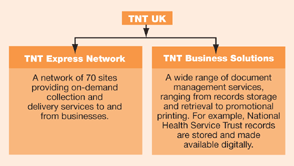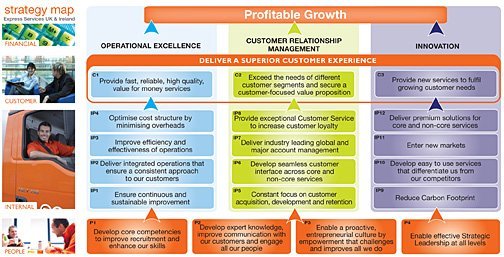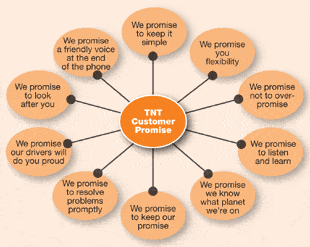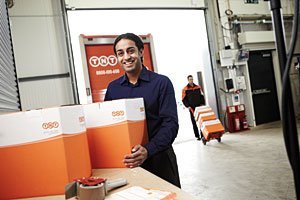
TNT is the market leader in the provision of business-to-business (B2B) express delivery services. It delivers documents, parcels and freight securely between businesses, using the road or air transport.
Ken Thomas founded TNT in Australia in 1946 with a single truck. It became Thomas Nationwide Transport (TNT) in 1958 and TNT Express Services UK in 1978. Today TNT is a global company and serves customers in over 200 countries around the world, employing 10,000 people in the UK. TNT has two operating divisions in the UK.
As a global company, TNT seeks to project a consistent image across the world. For example, it uses the global strapline ‘Sure we can’ on all its vehicles, aircraft and communications material.
Values

TNT’s values underpin the way the organisation runs. These values are the core principles or standards that guide the way TNT does business. While business plans and strategies may change, the core values of a business remain the same. TNT’s values are:
- Be honest
- Aim to satisfy customers every time
- Challenge and improve all we do
- Be passionate about our people
- Act as a team
- Measure success through sustainable profit
- Work for the world.
Every aspect of TNT’s business strategy focuses on ‘delivering a superior customer experience’. For example, TNT uses sophisticated technology to enable customers to check exactly where their deliveries are at any time.
Delivering through people
TNT Express UK delivers over 3.5 million items every week around the world. It is listed among Britain’s Top Employers and provides first-class working conditions and care for its employees. The company needs high-level skills to cover a wide range of functions, including distribution, sales and marketing, finance, customer services and HR. To attract and retain the best people TNT offers interesting careers, with opportunities for people to progress.
The case study explores how TNT delivers its business strategy and achieves consistently high standards of service through its people.
Mission, aims and objectives
TNT is the fastest and most reliable provider of express delivery services and is the European market leader. Organisations do not become market leaders by chance. It takes vision, careful planning, outstanding quality and a committed, highly trained staff. This organisation-wide planning is known as a business strategy. Organisations identify the goals that they want to achieve through:
- A mission
- Aims
- Clearly stated objectives.
Mission

A business’ mission is a statement that reflects its core purpose and principle business aims. It states what the business is, what it does and where it is heading. Employees and other stakeholders who have an interest in the organisation’s activities need to be able to understand the mission easily. TNT’s mission is to:
- ‘Exceed customers’ expectations in the transfer of their goods and documents around the world,
- Deliver value to our customers by providing the most reliable and efficient solutions through delivery networks,
- Seek to lead the industry by instilling pride in our people, creating value for our stakeholders and sharing responsibility around the world.
Aims and SMART objectives
The aims supporting this mission focus on efficiently transferring goods and documents, providing customer satisfaction and behaving responsibly. To achieve these aims the organisation needs to establish objectives at a number of levels. SMART objectives are designed to ensure that everyone understands what is required and by when. They make it easy to measure performance so that the business knows if and when its aims have been achieved. Where necessary, it can change its plans to overcome any problems or obstacles.
Specific – exactly what is to happen
Measurable – by quantity or proportion
Achievable – capable of being achieved within available resources
Relevant – to the overall business or corporate objectives
Time-related – with a deadline attached
Measurable objectives cover every aspect of TNT’s operations and service. The top-level objective is ‘to achieve profitable growth’. Examples of SMART objectives across the business that contribute to this include:
- ‘Answer 85% of calls from customers within ten seconds’. This objective fits with the mission ‘to provide the most reliable and efficient solutions’ for customers. TNT’s customer focus is one of the key ways in which it aims to differentiate itself from competitors.
- ‘To improve TNT’s carbon efficiency by 45% by 2020 (measured against the 2007 baseline)’. This example of a longer-term objective reflects TNT’s aim to reduce the environmental impact of its business.
Building a strategy
Business strategies are the means by which businesses achieve objectives. They usually take the form of long-term plans relating to the chosen markets, products and environment. A competitive strategy can be based on:
- Having a distinctive position in the market. TNT’s market position is based on differentiating itself from rivals through its speed, reliability and Provision of services of the highest standard.
- Building core strengths (known as core competencies). TNT’s strengths are based on attracting and developing high-calibre staff who are able to exceed customer expectations so that customers remain loyal to the business.
TNT’s strategies need to take into account a number of important areas. These include:
- What goods and services to produce, e.g. an integrated delivery service
- Which territories will deliver the best return on investment. TNT’s international operations focus on key trading areas of Europe, Asia, North America and South America.
- How to build a competitive advantage, e.g. by providing the most reliable, customer-focused services.
TNT’s Strategy Map

TNT’s Strategy Map puts the customer at the heart of everything that the business does. It communicates to everyone involved with the business how the company will meet its goals. Specifically, it acts both as a practical guide and as a framework to achieve the business objective of growing profits. A strategy map also serves as a reference point to align the whole organisation. This is vital to ensure everyone is focused on the aims and objectives and understands his or her role in the delivery of them. TNT Express’ commitment to the company strategy has been recognised as exceptional. During 2010, the company was admitted to the Palladium Hall of Fame. The Hall of Fame honours those organisations that have achieved extraordinary performance results through the use of the Kaplan-Norton Balanced Scorecard. Other companies in this prestigious group include Siemens, HSBC and BMW.
The basis of the Balanced Scorecard is, ‘what gets measured, gets done’. It helps organisations to establish how operational activities link to the strategy and provide measurable impact. TNT’s strategic map and its communications plan to cascade the strategy was judged by the Hall of Fame as ‘best in class’. Since undertaking the Balanced Scorecard, TNT has increased market share, improved customer loyalty and achieved a higher return on sales.

Tactics
Businesses deliver their strategies through a series of tactics. TNT’s practical measures are set out under three main headings – Operational Excellence, Customer Relationship Management and Innovation. The map describes the journey that TNT is taking towards achieving the long-term aims. For example:
- The map shows that Operational Excellence will be achieved through a solid foundation of fast, reliable and quality services.
- From there, the Customer Relationship is improved by understanding what different customers want. This builds a stronger allegiance and loyalty.
- Innovation is about anticipating the future needs of TNT customers. Through stronger relationships, the business can develop a joint approach and shared vision.
Delivering the strategy
TNT segments its customers according to their requirements. For example, some customers provide the company with ‘one off requests’. Others are major accounts regularly placing large orders. TNT responds to the needs of each of these customer groups in different ways and hopes for loyalty in return. The market is highly competitive and it is more cost-effective to keep repeat business than to generate new customers.
TNT’s Customer Promise

TNT monitors customer satisfaction through regular Customer Loyalty Measurements. TNT’s Customer Promise is part of its key strategy to retain customers by delivering a superior customer experience. To back this up, the company has set out ten promises.
In practical terms, meeting customer requirements involves delivering to the right place, at the right time. TNT Express often carries many different types of goods for which on-time delivery is vital. This ranges from delivering blood supplies for the NHS to freshly-felled fir trees for Christmas.
Developing people
TNT recognises that its people are the foundation on which it builds its customer-focused strategy. It needs to have the right people and skills to deliver the promises it makes. The business is committed to staff development. It promotes around 70% of its managers from within the organisation, enabling people to have long-term careers. Nearly 500 staff have at least 25 years of service each.

One key factor in TNT’s development of its people has involved training managers to become assessors and coaches of their teams. Through appraisals, managers find out what employees’ needs and aspirations are as well as their strengths. Identifying skills gaps as well as who is aiming for promotion enables TNT to put together effective training programmes. All managers possess a great knowledge of the way TNT works and with training can pass on that knowledge to make new workers more effective, and more quickly.
Strategic direction and strategic gaps

TNT has high-quality people working within the organisation in many different roles. These range from the front-line distribution of parcels and documents to accounts, sales and marketing functions. However, in places, TNT may require additional skills to bridge the gap between its existing human resources and those required to implement the strategy fully. This is referred to as a strategic gap.
By developing its people, TNT ensures that it will have the capability to meet and implement quickly any necessary changes in its strategy. TNT is committed to minimising the environmental effects of its operations and conducting its business in a sustainable way. For example, it recognised the value the business could gain from making drivers more aware of methods of driving which would improve safety and efficiency. Drivers are therefore trained in SAFED (safe and fuel-efficient driving) techniques, earning certificates of competence.
Pioneering qualifications
Another element of TNT’s strategic and innovative approach has been in the development of pioneering training qualifications with education providers. For example, students on the TNT Foundation degree with Hull College study on the job, at home and at college for nationally recognised degree-level qualifications. TNT also offers in-house a five-year apprenticeship programme for people under 22 years old, providing experience and relevant qualifications in vehicle maintenance.
These qualifications increase the skills and knowledge of employees, improving their ability to earn promotions and gain career advancement. The business benefits in terms of increased efficiency and cost savings. TNT’s programmes enable new recruits quickly to bridge the gap between study (at school, college, or university) and work. This makes commercial sense for TNT as it ensures that its workforce is committed, motivated and able to deliver on the Customer Promise.
‘No limits’

TNT’s philosophy is that there are no limits to how far the right talent can rise. For example, the recently retired Managing Director originally started out as a driver. Graduates joining TNT work on major projects across the company from the outset and often progress to management positions within five years. Such projects have included the Common Systems project. This involved implementing a new computer system for improving data entry across 50 different locations. This has reduced the time taken for data inputting significantly and has helped speed up service delivery.
Conclusion

Creating and delivering an effective business strategy involves:
- Having clear aims and objectives
- Building a competitive advantage by developing core competencies
- Identifying gaps and seeking to close these through the development of resources.
TNT demonstrates good practice in each of these areas. The company has clear business aims and objectives that are time-related. It focuses on developing a competitive advantage through its strategies for customers, innovation and its people. TNT ensures that the people working for the business have adequate opportunities to grow. It meets any gaps in the ability of the workforce to deliver its strategy by training and developing its existing people. This retains their skills and offers attractive career opportunities to recruit new talent.
